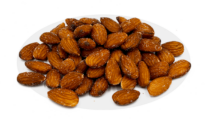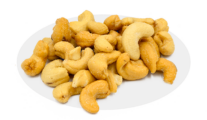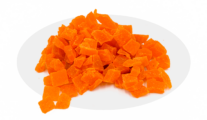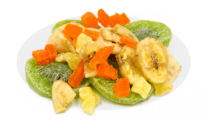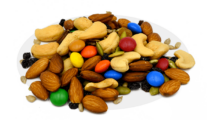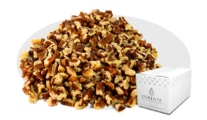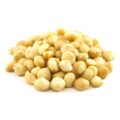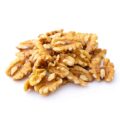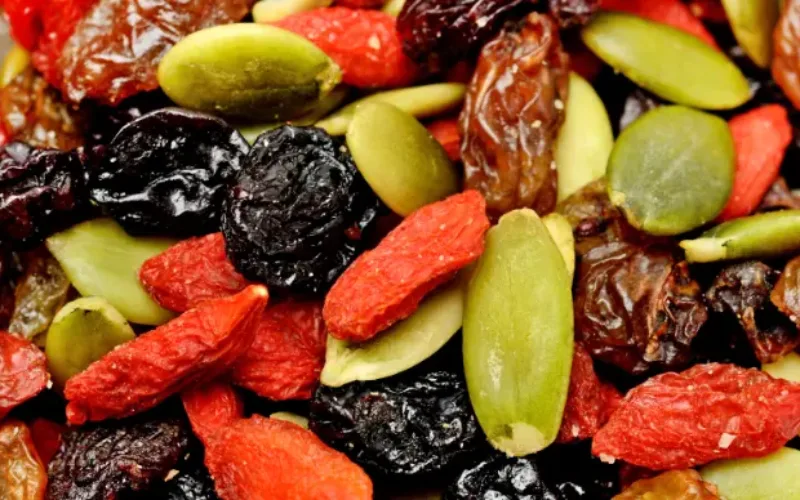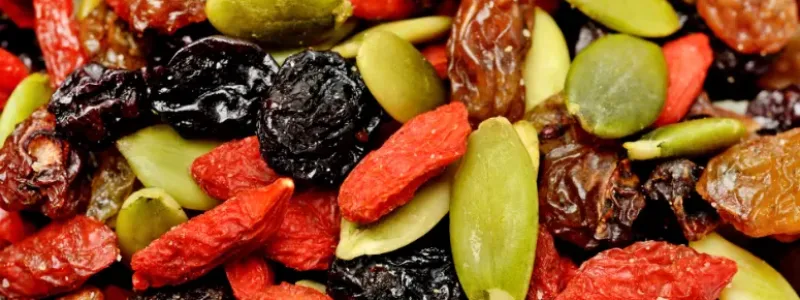Written By Sam Henselijn
Nuts are arguably delicious. They’re also incredibly filling, versatile foods that are especially popular with people following low-carb, high-fat eating diets like the ketogenic diet. But are nuts really keto-friendly?
Can you eat nuts on a keto diet?
Short answer: you can and should eat nuts on keto or low-carb diet! However, they are of utmost importance for those following the keto diet. That’s due to their incredible nutritional composition. Nuts are notorious for being high in healthy fats and protein, yet low in carbs. Not to mention, they‘re also packed with protein, which is the second most crucial macronutrient on the low-carb diet.
Additionally, nuts provide several vital micronutrients such as
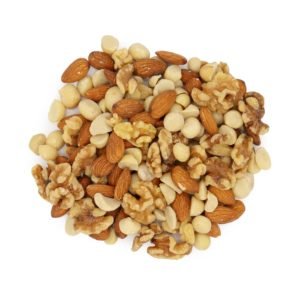
vitamin E, B vitamins, calcium, copper, iron, manganese, magnesium, potassium, selenium, zinc, and phytochemicals.
In sum, nuts might as well be the perfect keto-snack, delivering everything that you need: from ideal macros to taste.
3 reasons why nuts should be a part of your (keto) diet
They’re high in fat
Nuts are an easy way to get your fats on a keto diet without overindulging on carbs. In fact, most nuts contain less than 5 grams of net carbs per serving. Another plus, they also provide protein and fiber, which will help keep hunger at bay for longer.
Bad fats are what pose health problems. They come primarily from saturated and trans fats, neither of which are typically found in nuts. On the contrary, most nuts are loaded with good fats! These are monounsaturated and polyunsaturated fats.
Some of the best nuts to consume on keto are macadamia nuts, almonds, walnuts, brazil nuts, and pecans. On the other hand, cashews and pistachios are heavier on the carbs, so you might want to take a pass on these.
Protein, protein, protein
It’s important to make sure you’re getting enough protein while on
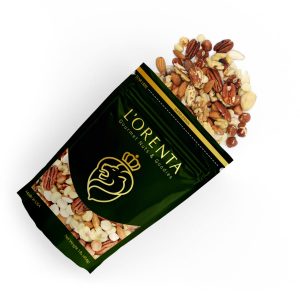
keto. Too little of it can compromise lean tissue mass. When daily protein intake is too low, the body turns to lean tissue to meet its protein needs.
Thankfully, nuts are also a great source of high-quality protein. It has been scientifically proven that protein can aid in preserving muscle mass in low-carb diets.
Nuts will keep you satiated for longer
The winning combo of protein and fats in nuts can help to curb hunger and, being low-carb, also prevent blood-sugar spikes. So even though nuts are calorie-dense, snacking on them can pay off by keeping you satiated for longer and supporting ketosis.
Their appetite-suppressing effects are commonly linked to the increased production of the hormones peptide YY (PYY) and cholecystokinin (CCK), both of which help regulate appetite.
Which nuts are keto friendly?
Several nuts are considered keto-friendly as they are low in carbohydrates and high in healthy fats. Here are some keto-friendly nuts:
Pecans: Low in carbs and high in fat, making them suitable for a keto diet.
Macadamia Nuts: High in healthy fats and low in carbs, macadamia nuts are an excellent choice for a keto-friendly snack.
Brazil Nuts: Rich in selenium and low in carbohydrates, brazil nuts can be included in a keto diet.
Walnuts: While slightly higher in carbs than some other nuts, walnuts are still relatively low in net carbs and provide a good source of omega-3 fatty acids.
Hazelnuts (Filberts): Hazelnuts are low in carbs and rich in healthy fats, making them keto-friendly.
Almonds: Almonds are moderately low in carbs and high in healthy fats, making them a popular choice for a keto diet.
Pine Nuts: Pine nuts are relatively low in carbs and can be incorporated into a keto meal plan.
Remember to consider portion sizes, as even keto-friendly nuts can contribute to calorie intake. Additionally, be cautious with flavored or sugar-coated varieties, as they may contain added sugars that can impact ketosis. Always check nutritional labels for accurate information.
How many nuts can I eat a day on keto?
The ideal amount of nuts to consume on a keto diet can vary depending on individual factors such as your specific nutritional needs, daily calorie goals, and how your body responds to different foods. However, as a general guideline, a serving size of nuts is typically around 1 ounce or 28 grams.
Here are approximate counts for some common keto-friendly nuts:
Almonds: About 23 almonds in a 1-ounce serving.
Pecans: About 20 pecan halves in a 1-ounce serving.
Macadamia Nuts: About 12-14 macadamia nuts in a 1-ounce serving.
Walnuts: About 14 walnut halves in a 1-ounce serving.
Brazil Nuts: About 6-8 Brazil nuts in a 1-ounce serving. (Only eat 2 a day to prevent selenium poisoning)
Hazelnuts: About 20 hazelnuts in a 1-ounce serving.
Keep in mind that while nuts are a healthy source of fats and protein, they are also calorie-dense. Overconsumption can contribute to an excess of calories, potentially hindering weight loss on a keto diet. It’s essential to factor in the nut consumption within your overall daily macronutrient and calorie goals. If you’re uncertain about the right amount for your specific needs, consulting with a registered dietitian or healthcare professional can provide personalized guidance
Can I eat cashews on keto?
While cashews are nutritious, they are higher in carbohydrates compared to some other nuts commonly included in a ketogenic (keto) diet. One ounce (about 28 grams) of cashews contains around 8 grams of net carbs, which can be relatively high for those strictly adhering to a very low-carb ketogenic diet.
If you choose to include cashews in your keto diet, it’s essential to be mindful of your overall carbohydrate intake for the day. Limiting the serving size can help you manage your carb consumption while still enjoying the nutritional benefits of cashews, such as healthy fats, protein, and essential minerals.
Remember that individual tolerance to carbohydrates varies, and some people following a keto diet may find that they can include small amounts of cashews without negatively impacting their ketosis. As always, it’s advisable to monitor your body’s response and adjust your diet accordingly. If you have specific dietary concerns or health conditions, consulting with a healthcare professional or a registered dietitian is recommended for personalized advice.
Sam Henselijn Author’s Biography – Meet L’Orenta Nuts CEO
Copyright 2024 L’Orenta Nuts
L’Orenta Nuts proudly holds the SQF food safety certification, symbolizing our unwavering dedication to upholding the highest standards of food safety and quality. This certification guarantees that our products undergo rigorous scrutiny, ensuring transparency, traceability, and adherence to global food safety regulations for the utmost consumer confidence.
L’Orenta Nuts has the HACCP (Hazard Analysis and Critical Control Points) certification is a systematic approach to identifying, evaluating, and controlling food safety hazards. It ensures that food products are produced and handled in a manner that minimizes risks and complies with safety standards.
Our GMP (Good Manufacturing Practices) certification ensures that a manufacturing facility adheres to comprehensive quality and safety standards while producing pharmaceuticals, food, and other consumer goods, promoting consistency, quality, and compliance with regulatory requirements.
L’Orenta is an FDA-approved manufacturing facility and has met the rigorous standards set by the U.S. Food and Drug Administration. It demonstrates compliance with regulations, ensuring the production of safe and high-quality food products.


